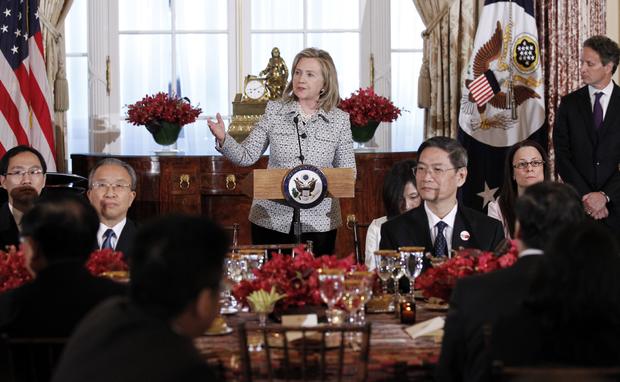Clinton: China on a "fool's errand" to stop history
Updated: 4:21 p.m. ET
Secretary of State Hillary Clinton sharpened her criticism of China in a recent interview, calling the nation's human rights record "deplorable" and arguing that Chinese leadership was engaged in a "fool's errand" to stop history.
In an interview with The Atlantic, Clinton spoke at length about the recent wave of uprisings in the Middle East, and argued that China was "worried" that they might spread.
"They're worried, and they are trying to stop history, which is a fool's errand," Clinton told the Atlantic's Jeffrey Goldberg. "They cannot do it. But they're going to hold it off as long as possible."
Clinton mirrored that sentiment on Monday in her opening comments at the US-China Strategic and Economic Dialogue, an annual meeting in Washington where top officials from America and China discuss military and economic issues, among others.
"We have made very clear, publicly and privately, our concern about human rights. We worry about the impact on our domestic politics and on the politics and the stability in China and the region. We see reports of people, including public interest lawyers, writers, artists, and others, who are detained or disappeared," Clinton said, in her remarks. "And we know over the long arch of history that societies that work toward respecting human rights are going to be more prosperous, stable, and successful. That has certainly been proven time and time again, but most particularly in the last months."
"The United States and China have to be honest about our differences, and address them firmly and forthrightly," Clinton emphasized, in remarks at the end of the two-day meeting.
President Obama has in the past pressed Chinese President Hu Jintao to adopt "certain rights...that we think are very important and transcend cultures," but he has so far been delicate with his criticism on the matter, and has maintained that the so-called "source of tension" between the two countries "doesn't prevent us from cooperating."
"China has a different political system than we do," Mr. Obama told reporters in a January appearance with Hu. "China is at a different stage of development than we are. We come from very different cultures and with very different histories. But as I've said before and I repeated to President Hu, we had some core views as Americans about the universality of certain rights, freedom of speech, freedom of religion, freedom of assembly that we think are very important and transcend cultures. I have been very candid with President Hu about these issues."
Clinton, however, went further, criticizing China for what she described as "deplorable" human rights record.
She still maintained, however, that the U.S. couldn't "walk away" from an important international relationship because its political system was not one "we would design or choose to live under."
Clinton emphasized that the United States, from a foreign policy perspective, does its best to promote democratic reform abroad while maintaining its international interests.
"We have encouraged consistently, both publicly and privately, reform and recognition and protection of human rights," Clinton said. "But we don't walk away from dealing with China because we think they have a deplorable human rights record."
Clinton also rejected the notion that promoting democratic principles while maintaining functional relationships with countries like China was a "contradiction."
"I wouldn't accept the premise," she said, of the idea. "I think that we believe in the same values and principles, full stop. We believe that countries should empower their people. We believe that people should have certain universal rights. We believe there are certain economic systems that work better for the vast majority of people than other subsystems."
But, she noted, "we live in the real world. And there are lots of countries that we deal with because we have interests in common."
Clinton also called for America's increased ideological engagement in the global arena, and expressed some fear that the U.S. was being outpaced in that capacity by countries like China and Russia.
"I testified before Congress a few weeks ago. I said we are losing the war of ideas because we are not in the arena the way we were in the Cold War," Clinton said. "I want to see us out there pitching our ideas. Now, we need to do it in a way that's more likely to be understood and received than just asserting it in a conclusory way, but no, we need to be much more engaged."
"China is starting an English-speaking television network around the world, Russia is, Al Jazeera. And the BBC is cutting back on its many language services around the world. We're not competing. I just feel like we're missing an opportunity," she added. "We have figured out (in America) how people from every part of the world, every kind of person you can imagine, can live together, can work together. It wasn't easy. It took a long time, but I think we know a little bit about how to do it, and we want to offer whatever assistance we can."
